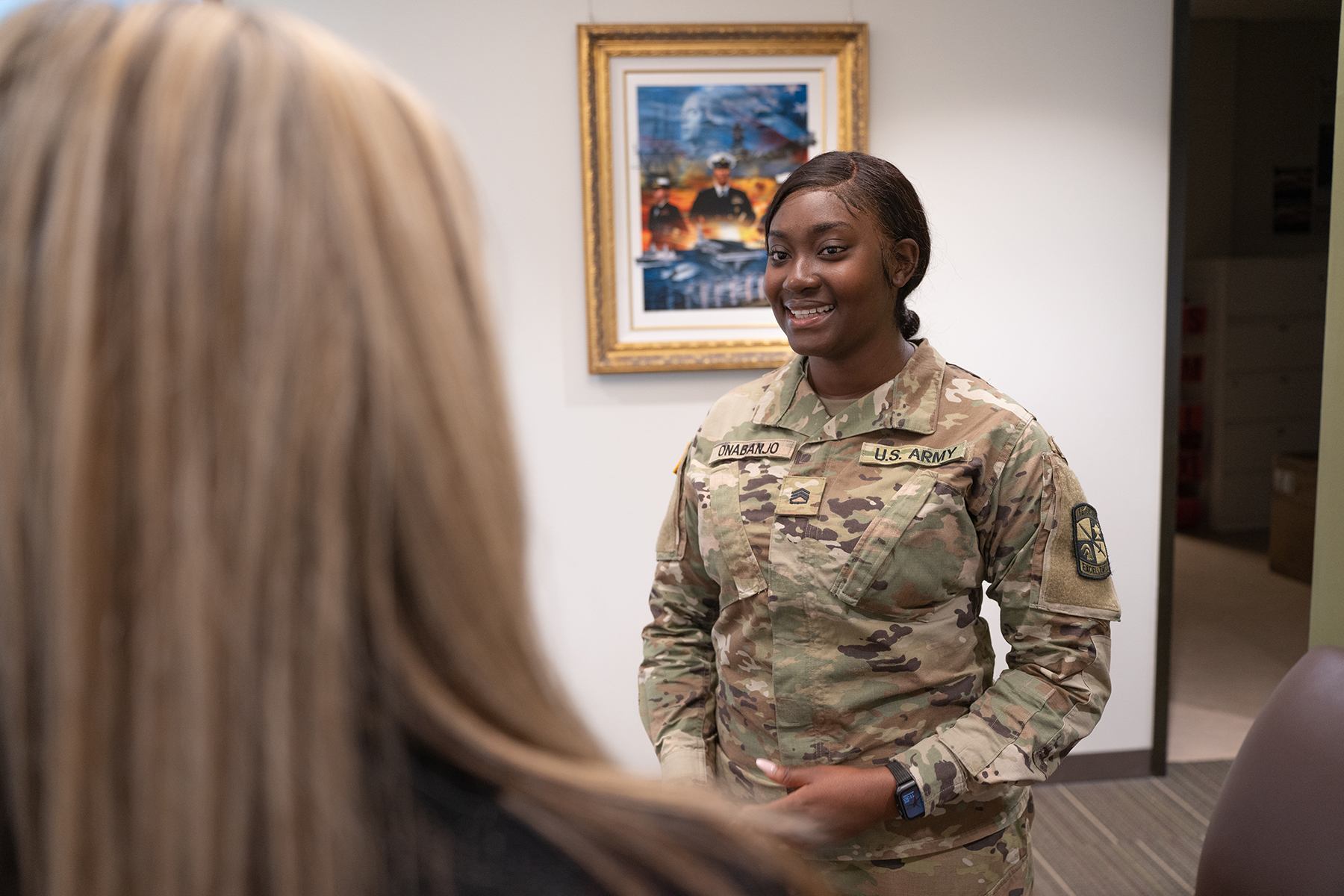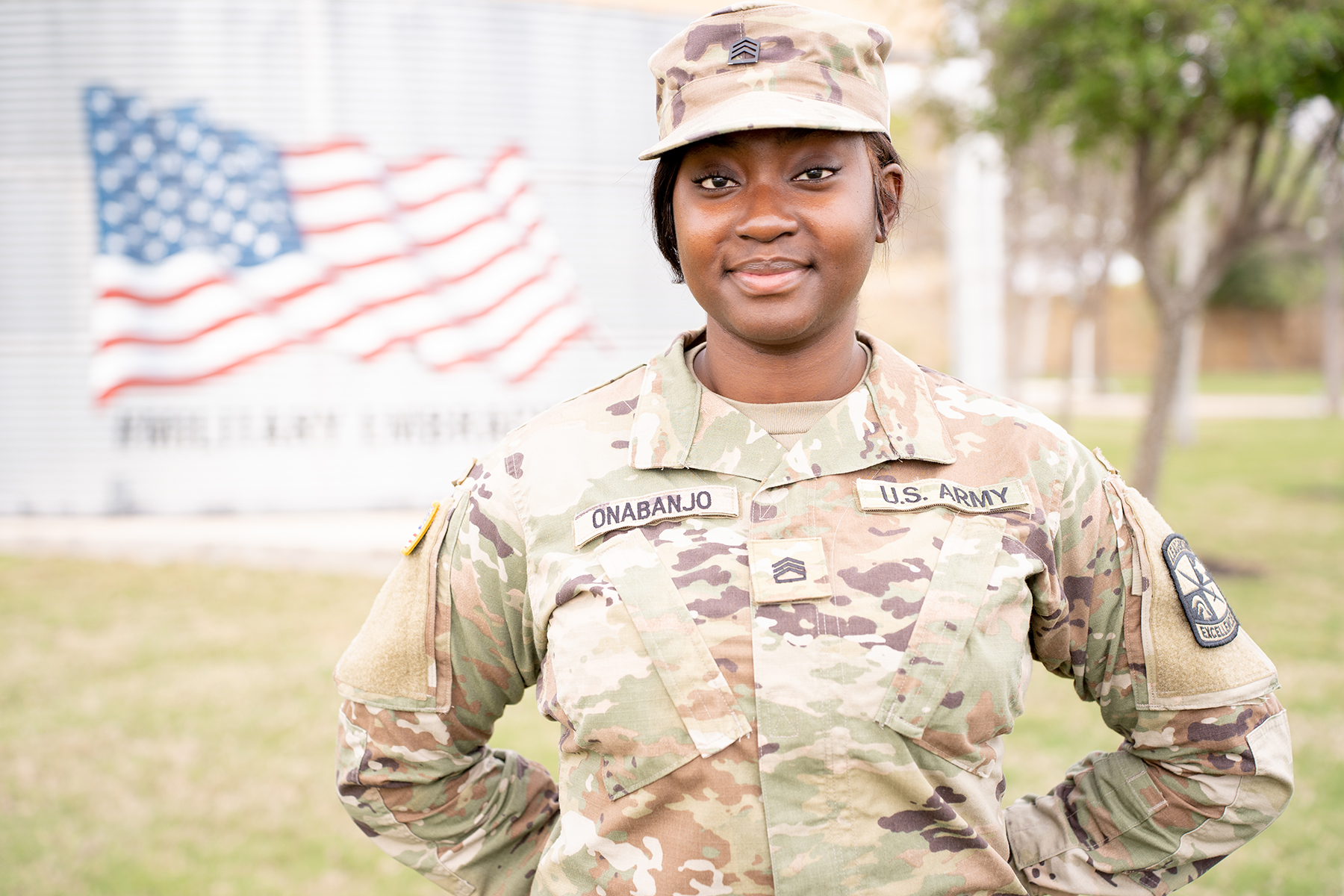Praise Onabanjo holds a lifelong dream to become a criminal defense attorney and stand up for the rights of the innocent. Though born in Minnesota, Onabanjo’s family hails from Nigeria and moved back to the country when she was nearly a year old, eventually making their way to the United Kingdom. Growing up between London and Nigeria, Onabanjo hoped to one day return to the United States.
“I moved back to the U.S. when I was 17. My mother felt I would have better opportunities here and because I wanted to study law, we agreed the U.S. was a better option as opposed to the U.K.,” explained Onabanjo, who is a criminal justice major at A&M-San Antonio.
One of eight siblings, Onabanjo is the only one from her family to reside in the U.S. She first headed to Los Angeles before deciding to attend Fort Hays State University in Kansas. Onabanjo joined the U.S. Army Reserve, setting her on a course to Texas and A&M-San Antonio.
“When I received my duty station for the Army, I said to myself, ‘Texas? I always wanted to live in Texas,’” she shared. “A&M has always been a school I wanted to go to and when I found out the Army was sending me to San Antonio, I decided I wanted to transfer to A&M-San Antonio.”
In the Army, Onabanjo originally served as a logistics specialist, but now is a fully contracted cadet. To expand her military expertise and make the most of her experience, Onabanjo joined the ROTC program at the University, including the Color Guard. Graduating from A&M-SA in May 2024, she aspires to attend law school and become a JAG officer in the Army. Currently, Onabanjo is 9 Romeo or 9R, which means she is training to be an officer.

“Everything there is to learn about being a leader in the Army is what I do now,” said Onabanjo. “I will be going to cadet training this summer and putting it all into practice for 35 days at Fort Knox Kentucky. When I finish, I will commission as a second lieutenant.”
Not only is Onabanjo a full-time student while balancing her responsibilities in the Army Reserve and ROTC, but she also holds a full-time job as correctional officer at Ruben M. Torres Unit, a state prison for men located in Hondo, Texas. As a correctional officer, Onabanjo said security and keeping her fellow correctional officers, the inmates and the community safe is the focus of the job.
“To be a female correctional officer in a male prison is challenging and our main focus is security,” she explained. “We make sure the inmates are doing what they are supposed to be doing. We check their cells and bodies for contraband and prevent escape. We are trying to keep society safe and it all starts from within the prison.”
Her experience in the military and as a correctional officer go hand and hand. She applies both what she has learned in the Army and at the prison to her respective roles.
“My expereince has helped me in my military career in the sense that in the military they teach us to always look out for one another,” she said. “Know what they are doing at all times and be your brother’s keeper. Same with the prison. We have a team that keeps each other in check as it is not just your life on the line, but my life too. If I am keeping you in check, you are also keeping me in check.”
| My goal is to change lives and defend innocent people. I want to be that one lawyer who will not stand for an innocent person to go to prison. |
| – Praise Onabanjo |
“The same with the Army,” she continued. “It has taught me discipline. You have to be disciplined in the prison. You are dealing with people with very different life experiences. With ROTC, I am learning how to be a good leader. In the prison, you are a leader. You are trying to give orders and lead them down the correct path.”
Though Onabanjo has a priority to keep her fellow correctional officers and the community safe, she also has an obligation to ensure the safety of the inmates. Part of that is making sure they are mentally safe.
“We know they are locked up 24/7. We know their mental health is affected,” Onabanjo said. “So, part of my job is to make sure they are okay.”
She sights one inmate who was struggling with the loss of his mother.
“He was going to commit suicide. My impact was to help him get through the grieving process by doing my job,” she recalled. “And asking, ‘Are you ok? Do I need to send you to medical? Do you need to talk? What can I do to help you through this process?’ If I’d left him, he might feel all alone and there’s nothing left for him.”

“Same thing with the Army,” Onabanjo added. “They teach us that if you see something or someone who is usually a happy person and see signs, ask if they are okay. Suicide is a big issue in the Army and the prison system. I always try my best to keep up with these things and ask, ‘How are you doing?’”
Onabanjo’s sense of responsibility and compassion extends to her plans of becoming an attorney. She admits she is not pursuing law for the money, but because she is passionate about justice.
“My goal is to change lives and defend innocent people. If I was in it for the money, I would do contract or business law. It is a passion. I cannot stand injustice,” she shared. “Where I come from, there is a lot of injustice, especially because there aren’t means for good counsel to defend your case and you just end up getting thrown in prison. I want to be that one lawyer who will not stand for an innocent person to go to prison. I will do my job regardless of my client’s ability to afford legal services.”
Onabanjo said she also relates and applies her experiences as a correctional officer to her classes at A&M-San Antonio.
“I had a class called Gangs and Gang Behavior,” she said. “We have a lot of gangs at the prison. I brought in my expereince and related it to class and told stories that connected to what the professor was discussing, such as how you can identify tattoos and hand signs as gang related and tell which inmates are a part of certain gangs.”
Though Onabanjo plans to make a successful career as an attorney in the Army, she also hopes to one day have a family and contribute her legal expertise to benefiting her home country.
“When I am finished with the Army, I may return and work with foundations to educate people about criminal-justice issues,” she shared. “I love my country. And things can be changed if one person chooses to be better. If you can choose to be better, you can teach another person to be, and it goes on like that, and the country will change for the better.”